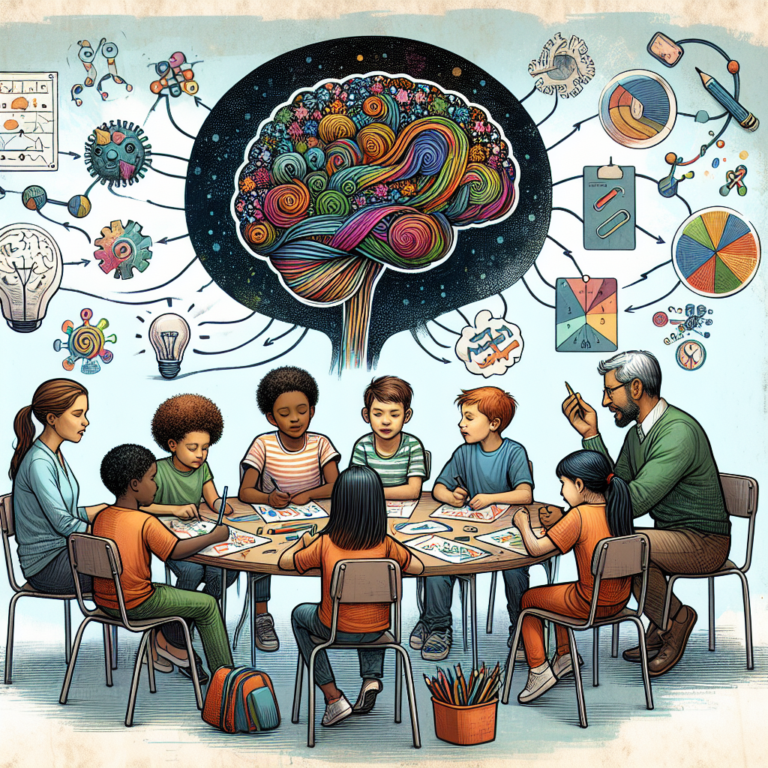
Introduction
In a fast-paced, often chaotic world, the concepts of compassion and kindness might seem like mere ideals—nice to practice but not fundamentally impactful. However, the truth is that "The Science of Compassion: How Kindness Can Heal Our Minds" is a paradigm that holds profound insights into our mental health, emotional well-being, and even our physical health. Research suggests that kindness isn’t just a nice gesture; it is a life-altering force that shapes our experiences, relationships, and overall happiness.
Consider this: What if the key to reducing anxiety and increasing happiness lies in our capacity for empathy and compassion? This article delves into the science behind these transformative concepts, illustrating how kindness acts as a catalyst for healing and connection. From groundbreaking studies to inspiring case studies, join us in exploring the undeniable power of compassion and how it can profoundly change our lives.
The Neuroscience of Compassion
Understanding Compassion
To dive into "The Science of Compassion: How Kindness Can Heal Our Minds," we first need to define compassion. Compassion is the emotional response of caring for someone who is suffering, coupled with a desire to help alleviate that suffering. It’s more than mere empathy; compassion requires action.
The Brain’s Response to Kindness
When we engage in acts of kindness or even think about compassion, specific areas of our brain light up. Neuroimaging research reveals that the anterior insula and the anterior cingulate cortex are activated when we experience feelings of compassion. This activity is linked to emotional regulation and the perception of others’ emotions, reinforcing altruistic behavior.
For example, a study published in Social Cognitive and Affective Neuroscience found that individuals who regularly practice kindness showed more robust neural responses in these areas, suggesting that kindness is not merely a behavior but a transformative habit that reshapes our brains.
Case Study: The Healing Power of Kindness in Hospitals
A notable case study conducted at the Cleveland Clinic revealed that patients who received acts of kindness, such as hugs, kind words, or simple gestures of care, reported lower levels of anxiety and pain. Nurses who engaged with patients on a personal level contributed to their overall healing process, demonstrating that compassionate care in clinical settings is invaluable.
Analysis
This study illustrates that kindness is not just good for the soul; it translates into tangible outcomes in physical health. When we approach others with compassion, we create a supportive environment that promotes healing.
Mental Health Benefits of Kindness
Kindness and Reduced Anxiety
Several studies have shown a direct correlation between acts of kindness and reduced levels of anxiety. Practicing kindness activates the brain’s reward centers, releasing neurotransmitters like dopamine, which foster a sense of connection and happiness.
Case Study: The Kindness Curriculum
In a groundbreaking program called the "Kindness Curriculum," researchers from the University of California, Los Angeles (UCLA) implemented a kindness training program for elementary school children. The program led to a significant reduction in anxiety and behavioral problems among participants, highlighting how teaching kindness can help cultivate emotional resilience from a young age.
Analysis
This case study reinforces the importance of integrating kindness into education. Teaching children empathy and compassion not only helps them develop emotionally but also equips them with tools to manage stress and anxiety later in life.
The Psychological Impact of Gratitude
Gratitude often coincides with kindness, creating a cyclic relationship that reinforces both. Practicing gratitude has been shown to enhance overall well-being and foster feelings of warmth toward others. Research published in the Journal of Happiness Studies indicates that expressing gratitude can lead to higher levels of prosocial behavior.
Table: Benefits of Kindness on Mental Health
| Type of Kindness | Mental Health Benefit | Supporting Study |
|---|---|---|
| Random Acts of Kindness | Reduces anxiety | “Kindness Spillover: A Case Study” |
| Compassionate Action | Promotes emotional well-being | Journal of Happiness Studies |
| Teaching Kindness to Kids | Enhances emotional resilience | “The Kindness Curriculum, UCLA” |
| Expressing Gratitude | Increases prosocial behavior | Journal of Happiness Studies |
Physical Health Benefits of Kindness
Kindness and Physical Health
Research indicates that kindness isn’t just beneficial for our minds; it affects our physical health too. Engaging in acts of kindness can lower blood pressure, improve heart health, and increase longevity. A study by Dr. Stephen Post demonstrated that individuals who engage in altruistic behavior live longer than those who do not.
Case Study: Volunteering and Health Outcomes
An intriguing longitudinal study published in the American Journal of Public Health analyzed the health of older adults and found that those who volunteered regularly experienced better overall mental and physical health. Volunteers reported lower levels of depression and increased feelings of happiness compared to their non-volunteering counterparts.
Analysis
The findings from this study emphasize the multi-faceted benefits of kindness, illustrating how altruistic actions can have profound effects not just emotionally, but also physiologically.
The Impact on Stress Reduction
Engaging in kind acts has been found to decrease stress levels. When we help others, our bodies release oxytocin—often referred to as the "bonding hormone"—which has a calming effect and reduces cortisol levels, the hormone responsible for stress.
The Ripple Effect of Kindness
Creating a Kind Community
One of the most compelling aspects of "The Science of Compassion: How Kindness Can Heal Our Minds" is how it establishes a ripple effect throughout communities. Kind actions foster an environment where empathy becomes a cultural norm, encouraging more individuals to engage in kindness.
Case Study: The Kindness Revolution
A movement initiated by the Random Acts of Kindness Foundation encourages people to perform acts of kindness, however small, and share their stories. This movement has connected millions around the world, spreading positivity and further igniting the cycle of compassion.
Analysis
The Kindness Revolution clearly shows that acts of kindness can grow exponentially, creating substantial change at both individual and community levels. When kindness becomes a shared value, everyone reaps the benefits, enhancing societal well-being.
Practical Ways to Cultivate Compassion
Daily Acts of Kindness
Incorporating small, daily acts of kindness can drastically change our perspective and enhance mental health. Simple gestures like offering a compliment, helping a neighbor, or volunteering time can lead to significant emotional benefits.
Mindfulness and Compassion Training
Mindfulness practices that focus on compassion can deepen our understanding and enactment of kindness. Programs like Mindfulness-Based Compassionate Living (MBCL) combine meditation with actionable kindness training to enhance emotional intelligence.
Gratitude Journals
Keeping a gratitude journal where you reflect on acts of kindness (both given and received) can amplify feelings of compassion and strengthen mental health. Studies indicate that this practice can foster a more positive outlook on life.
Conclusion
The exploration into "The Science of Compassion: How Kindness Can Heal Our Minds" reveals that kindness is more than just a fleeting emotion; it is a powerful tool for healing, both mentally and physically. From shaping our neural pathways to enhancing community bonds, the impact of compassion resonates deeply within society.
By committing to practicing kindness daily—through simple actions, mindfulness, and gratitude—we not only transform our lives but also inspire those around us to do the same. As we embrace the science behind compassion, we unlock the potential for profound change within ourselves and our communities.
FAQs
1. What is the primary benefit of practicing kindness?
The primary benefit of practicing kindness is enhanced emotional well-being. It reduces anxiety, promotes happiness, and fosters a sense of connection with others.
2. How does kindness affect mental health?
Engaging in acts of kindness activates the brain’s reward centers, releasing neurotransmitters like dopamine and serotonin, which are linked to feelings of happiness and well-being.
3. Can small acts of kindness really make a difference?
Absolutely! Small acts of kindness can create a ripple effect, leading to more significant societal change and enhancing the emotional climate of communities.
4. What role does compassion play in stress reduction?
Compassionate actions release oxytocin, which has a calming effect and reduces cortisol levels, leading to lower stress and better overall health.
5. How can I cultivate more kindness in my daily life?
You can cultivate kindness by incorporating simple acts of kindness into your daily routine, practicing mindfulness, and keeping a gratitude journal that focuses on compassionate actions.
Through understanding and embracing "The Science of Compassion: How Kindness Can Heal Our Minds," we open ourselves to a world of possibility—one where our actions foster healing, connection, and profound change. Let us commit to a kinder future, for ourselves and for the world.













